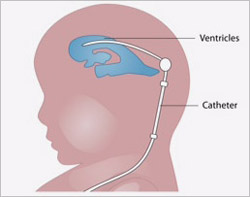Scan may identify best candidates for fetal spina bifida surgery
NIH-funded study links enlarged brain cavities to need for second surgery after birth
Fetuses with enlarged ventricles—the fluid-filled cavities inside the brain—may be less likely than their counterparts to benefit from surgery in the womb to treat spina bifida, according to a study supported by the National Institutes of Health.
Researchers found that fetuses with enlarged ventricles were more likely to require a second surgery to relieve a life-threatening build-up of pressure within the brain. Given the risks that fetal surgery poses for mother and newborn, the findings indicate that, in these cases, it may be better to wait until after birth to perform the corrective spinal surgery. The scientists made this discovery by analyzing data from the NIH’s Management of Myelomeningocele (MOMS) study.
This page was last updated on Friday, January 21, 2022
